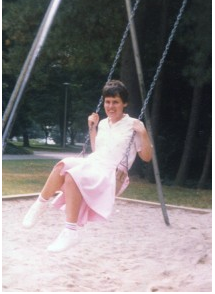Frances' Story
Some people thought it couldn’t be done, but in 1994 a small group of dedicated friends and supporters successfully set up a Representation Agreement for a woman with no family and very limited ability to communicate.
Frances was a woman who was supported by the Community Living Society. She lived in a home with two other women.
 Lynn Thomas, of the Community Brokerage Services Society, first met Frances several years ago. Frances was ill with cancer. She had already had a serious health crisis because no one was available to consent to health care. She had difficulty understanding the doctors and they did not understand her communication. Frances had no family members or close friends to help make health care decisions and group home staff do not have legal authority to make health care decisions for the individuals they support.
Lynn Thomas, of the Community Brokerage Services Society, first met Frances several years ago. Frances was ill with cancer. She had already had a serious health crisis because no one was available to consent to health care. She had difficulty understanding the doctors and they did not understand her communication. Frances had no family members or close friends to help make health care decisions and group home staff do not have legal authority to make health care decisions for the individuals they support.
Lynn Thomas was a community services broker. She helped individuals figure out what services they need and where to find them. Lynn realized that what Frances needed was a personal network. Lynn also saw that the Representation Agreement provided a framework to guide the process of identifying personal supporters and outlining their role.
With a little searching, Lynn found two people who had known Frances for many years and were willing to become her personal supporters. One was a childhood friend and the other was the mother of another person in Frances’ home who had always looked out for Frances knowing she had no family.
Both personal supporters were nervous about helping Frances with what might be serious health matters. How would they help Frances navigate through the health system? How would they know what Frances wanted and how would they communicate with her? It seemed like a big responsibility.
So Lynn brought together all the people involved in Frances’ care to learn about Representation Agreements. She invited Christine Gordon and Joanne Taylor from the Community Coalition to assist. “Having this outside resource was a big, big help,” said Lynn.
After hearing the information, the group started by identifying everyone involved in Frances’ life and defining each person’s role in supporting her. They used a worksheet provided by the Coalition, filling it in and expanding on the basic elements, to put together a Representation Agreement, which was modeled on the yet to be proclaimed Representation Agreement Act.
As they were thinking of what things needed to be addressed, they continually asked themselves, “If Frances could communicate verbally, what would she tell us to do?” Since Frances’s condition was rapidly deteriorating and the group knew her illness was terminal, they also asked, “How would Frances want to spend her last days? How can she be supported with dignity and respect?”
To ensure Frances was directing the care decisions, Lynn contacted someone with experience in nonverbal methods of communication who helped the group home supervisor develop an album. The album included photos of Frances’ personal and staff supporters including the other residents of the group home. A picture script enabled discussion with Frances about the issues involved.
 The final Representation Agreement, so carefully thought through, listed Frances’ two personal supporters as joint representatives. If a decision needed to be made, the representatives and the staff worked together to determine what Frances wanted. Lynn believes that having so many people involved is a great advantage, “They all care about Frances and they share a common goal.” The larger group acts as a safety net, and the representatives don’t feel alone or burdened by the responsibility.
The final Representation Agreement, so carefully thought through, listed Frances’ two personal supporters as joint representatives. If a decision needed to be made, the representatives and the staff worked together to determine what Frances wanted. Lynn believes that having so many people involved is a great advantage, “They all care about Frances and they share a common goal.” The larger group acts as a safety net, and the representatives don’t feel alone or burdened by the responsibility.
“It helps to anticipate situations and cover as many bases as possible ahead of time,” says Lynn. “We discussed issues that would arise as Frances’ health deteriorated, and planned for them in the Agreement.” These included palliative care, pain management, dying at home, and a ‘Do Not Resuscitate’ order. Frances made it clear that she was most comfortable in her own home. “We needed to think ahead how we could honour that. We had to think of how this might affect the other residents.”
The Agreement also addressed the role of Frances’ health care professionals. Lynn went with Frances and her staff to her medical specialist, naturopath and community health nurse, and told them about the Representation Agreement. For example, Frances was very clear in her behaviour that she enjoyed going to her naturopath. The other health care workers, including the oncologist, all enthusiastically agreed to cooperate with Frances and her representatives. This was about Frances’ quality of life and her wishes.
With so many people involved in the Agreement, good communication was vital. “There has to be a clear flow of information… not just about big things, but about little details too,” said Lynn. Lynn was the monitor in the Agreement and helped with communication. Lynn gathered information, passed it on, and made sure that everyone was carrying out their role and duties according to the Agreement.
“We took on a challenging situation,” admits Lynn. “But the process evolved naturally as we went along.” And the key that made it all possible was the committed support of a group of caring and dedicated people who wanted to assist Frances to have a voice in her care.
On September 1, 1995, Frances died peacefully in her home surrounded by people who cared about her. The Representation Agreement had ensured that her last wishes were carried out.
A few weeks after Frances’s memorial service, her representatives and the other supporters who assisted them came together to reflect on their experience. The process of making and living the Agreement with Frances had been a powerful one. “It kept us so focused on Fran,” everyone agreed, “and it gave us the confidence and the credibility to speak up for her. The Representation Agreement will be her legacy.”
This story is about one of the first Representation Agreements made in British Columbia. The Representation Agreement Act was passed in July 1993 but was not yet in effect. With the support of the Representation Agreement Task Group of the Community Coalition, citizens tried out Representation Agreements based on the new legislation. Their experiences provided invaluable knowledge that has shaped the law and practice of Representation Agreements. We are grateful to these leaders.
SIGN UP FOR NEWSLETTER
Stay updated on the latest developments, resources, and more.
© 2025 Nidus Personal Planning Resource Centre. All rights reserved.

